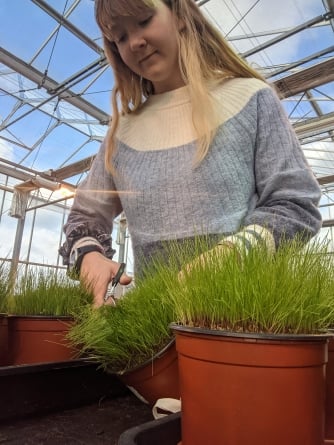Diving into the efficiency of controlled release fertilisers
Important research at Bangor University
On this page:
ICL’s new eqo.s biopolymer controlled release fertiliser coating technology is being tested in independent research at Bangor University. Masters student Elin Thompson has included the new biopolymer coating in her research study on the efficiency of controlled release fertilisers.
A Masters by Research (MScRes) is an independent research master’s degree. The topic of Elin’s research is to demonstrate the nitrogen efficiency of controlled release fertilisers (CRF). She will compare existing polymer coated fertilisers with new biopolymer coated fertilisers. Theoretically, all products should perform similarly, but the biopolymer coating will also completely degrade away, leaving no trace behind in the soil.

Elin takes a gas sample from a 6 liter sealed container with the agronomic pots placed inside after they have accumulated emissions over a 60 minute period. The gas will then be analysed for NO2, CH4 and CO2
Elin has already finished her first reviews and plans to conduct several experiments in controlled environment to review the relative performance or impact of each fertiliser in a number of important areas. She will be investigating ammonia emissions, ammonium and nitrate leaching, turfgrass growth and yield, turf colour responses and Nitrous Oxide emissions. These will give a broad assessment of the product performance and environmental impact.
ICL has facilitated and funded this research on CRF efficiency, and has supplied the fertilisers for Elin’s research but that is where the involvement ends. The university is completely in charge of how the research is conducted.
Elin was not familiar with ICL before she started her studies. “I didn’t know ICL nor the fertiliser industry as a whole”, Elin admits. “I now know that there are a lot of products on the market and I like that ICL strives to develop to more sustainable products. Supporting research such as mine, is an essential part of the process of creating innovative and sustainable products. And by scientifically stress testing the new CRFs, ICL can further help customers understand all aspects of the product performance.”

Elin takes a biomass cutting of the agronomic experiment in the greenhouse, She cut each pot down to a 2 cm height to measure how much yield has grown over a 2 week period
Elin hopes to add to the existing research that proves the new biopolymer eqo.s technology is the perfect replacement for the current polymer coatings and will perform similar or even better in terms of turf growth, yield, and soil health. This will not only be better and safer to the turf but will also reduce the environmental impact significantly and be a true gamechanger for the industry. Elin said “I hope to demonstrate an equal, or even better nitrogen efficiency, and that one application of a biodegradable CRF can sustain and maintain the crop for months.”
During this research, Elin has to demonstrate a wide variety of skills; from research and laboratory skills, to experimental design and public speaking. When asked if this is in line with her future plans, she responds: “This Masters by Research is an interesting challenge and the skills that I am learning will certainly be very helpful for my development. In the future I see myself as a researcher in a business setting, rather than remaining in the academic world. I like the idea of improving future environmental products, environmental business innovation, or conducting environmental assessments.”
Her interest in environmental-related topics have been a common thread in Elin’s career path so far. Originally, Elin studied Marine Zoology, spent 6 months in Indonesia conducting coral reef surveys, and studied the effects of plastics on marine life. Afterwards she started working as a lab technician for the agricultural department at Bangor University. Elin was already working with soil when she started this Masters by Research to study the efficiency of controlled release fertilisers. “I am happy that I can contribute to the development of more sustainable turf management practices.”


